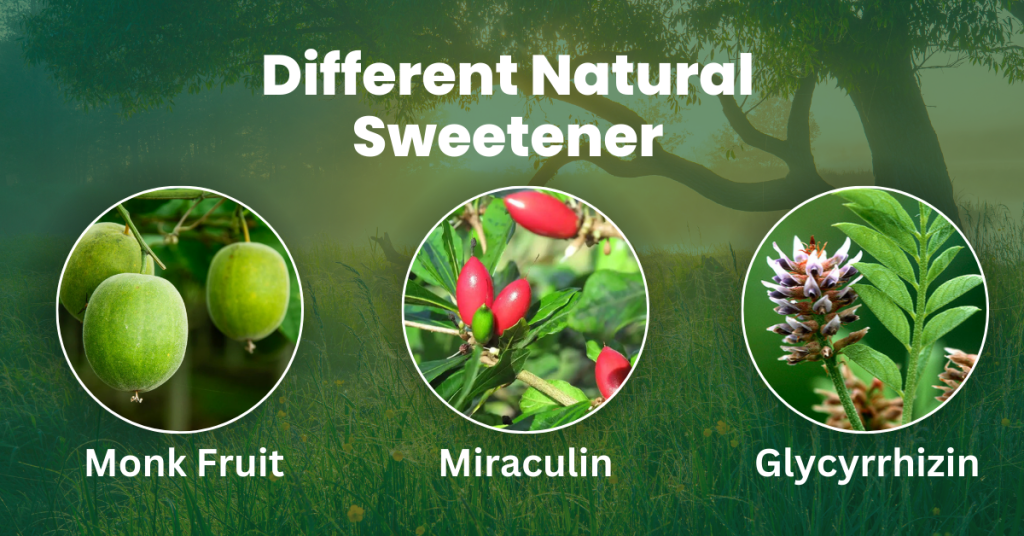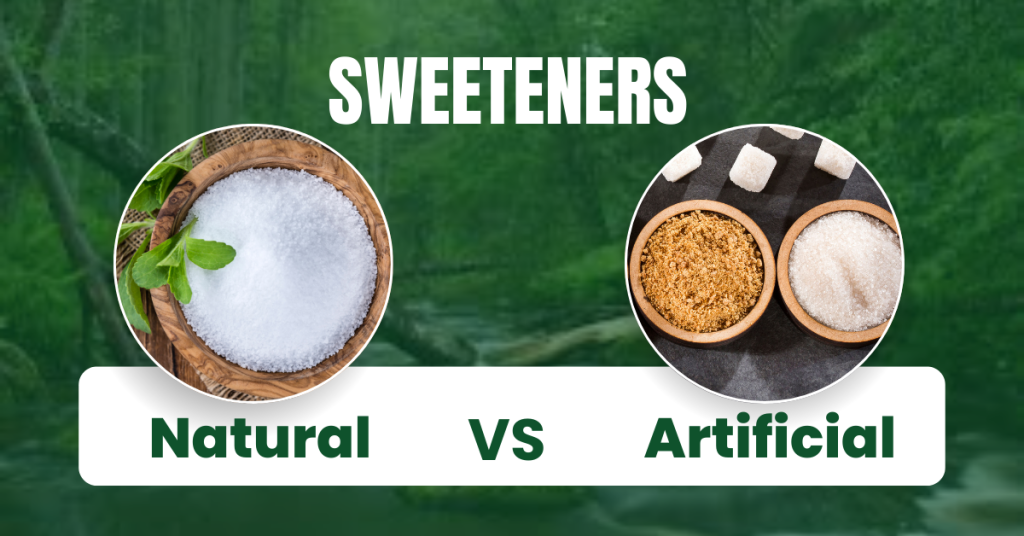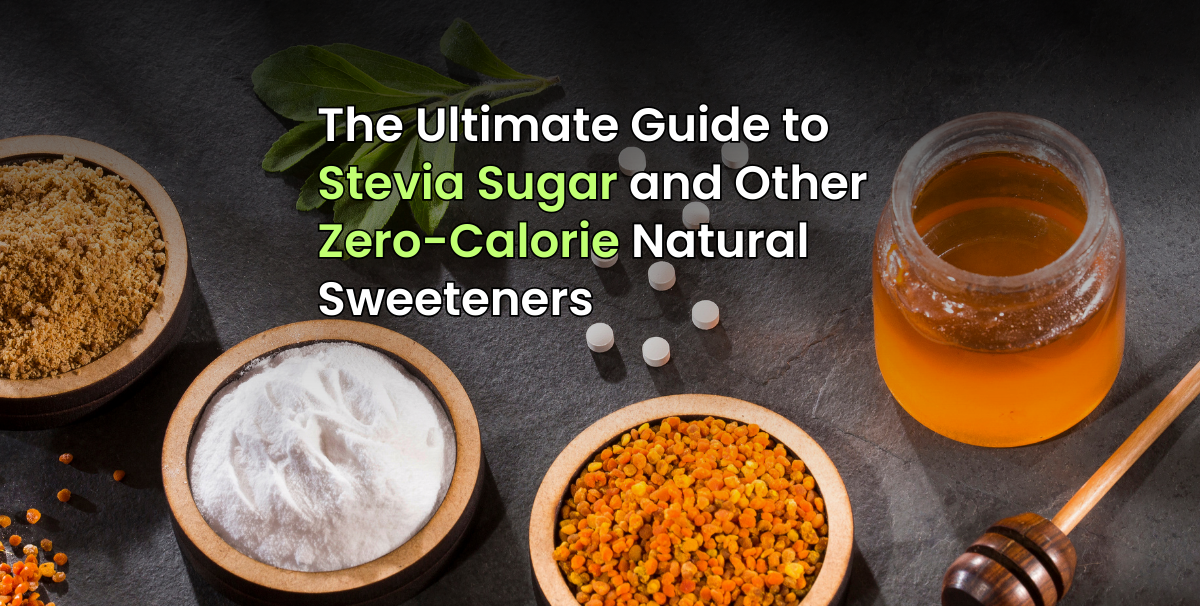The health-conscious world of today has caused a huge surge in the need for zero-calorie sweeteners. People look for alternatives to white sugar because of fear of weight gain, diabetes, and general health issues. However, there is a common belief that all sugar substitutes are man-made. Although synthetic sweeteners such as aspartame and saccharin have dominated the market for decades, there are natural
options that have been consumed for centuries in many cultures around the world.
Of these, Stevia sugar is extremely popular as one of the most researched and used natural sweeteners. Made from the leaves of the Stevia plant, it provides a sweet flavor without the ill effects on health from refined sugar. But Stevia is not the only natural sweetener. Some other plant-based sweeteners like monk fruit, glycyrrhizin in licorice root, and miraculin in the miracle fruit also deliver sweetness without extra
calories.
Knowledge of these sweeteners, their advantages, and possible disadvantages is key to making a wise choice on lowering sugar consumption while still enjoying the desired degree of sweetness in food and drinks.
Origins and Benefits of Stevia Sugar
Stevia sugar, also known as natural Stevia, is a product derived from the leaves of the Stevia rebaudiana plant native to South America. Stevia leaves have been used by the indigenous people in Paraguay and Brazil for sweetening teas and traditional medicinal brews for centuries. The plant’s natural sweetness is due to its special compounds, steviol glycosides, which account for its ability to deliver powerful
sweetness without the presence of calories.
The most important advantage of Stevia sugar is that it contains zero glycemic index, meaning it does not create a blood sugar spike. Therefore, it is the best option for people suffering from diabetes or those on a weight control diet. Secondly, scientific studies indicate that Stevia can help with various health benefits, including controlling blood glucose levels, inflammation reduction, and a healthy heart.
As opposed to white sugar, linked with obesity, tooth decay, and metabolic disease, Stevia does not contribute to these adverse health impacts. Stevia has been authorized for use as a safe alternative to sugar by regulatory agencies like the U.S. Food and Drug Administration (FDA) and the European Food Safety Authority (EFSA), further confirming its status as an effective and safe sweetener.
Types of Stevia and Its Useful Applications
Stevia exists in various forms, each best suited for different types of culinary preparation. The most natural form, dried stevia leaves, allows users to either infuse them in hot water or grind them into powder for cooking and baking. However, the majority of Stevia products sold commercially are in the form of liquid, powder, or granules.
People most often use stevia powder as a sugar substitute in baked products, but they must reduce the amount since stevia is much sweeter than sugar. Liquid Stevia drops are a good option for sweetening drinks like coffee, tea, and smoothies. Other Stevia products are mixed with other sugar alcohols, like erythritol, to produce a texture and flavor closer to white sugar.
Although Stevia provides a good sugar substitute, some people experience a slight aftertaste, which may differ based on the brand and processing. To counteract this, it is recommended to use high-quality Stevia extracts with a high-purity content of steviol glycosides.
Other Zero-Calorie Natural Sweeteners

Whereas Stevia is among the most popular sugar substitutes, there are several other natural sweeteners with similar advantages. Various cultures have traditionally used these, and they are gaining popularity in contemporary health-oriented diets.
Monk Fruit (Luo Han Guo)
Monk fruit, or Luo Han Guo, is a sweetener derived from a small Chinese melon. It has been utilized by Chinese herbalists for thousands of years as a remedy for numerous ailments, ranging from sore throats to digestive issues. The sweetness of the fruit comes from compounds called mogrosides, which are sweeter than sugar but contain no calories.
Like Stevia, monk fruit is also a zero-calorie sweetener, therefore, the best option for those who desire to manage their blood sugar. The heat stability property of monk fruit means that the sweetness is not lost even when used in cooking and baking. Unlike some artificial sweeteners, monk fruit does not have a bitter aftertaste, which is why it is widely preferred by many individuals who are looking for
a more natural alternative to sugar.
Glycyrrhizin (Licorice Root Sweetener)
Glycyrrhizin is a plant-derived sweetener from the licorice root plant. It is a century-old component of traditional herbal medications that comes with intense sweetness alongside medicinal properties. It is ubiquitously found in herbal tea, traditional candies, and sore throat and cough medicament syrups.
Although glycyrrhizin has no calories, excessive consumption is unhealthy, particularly in controlling blood pressure. It has been noted that high doses of glycyrrhizin can lead to sodium retention and reduced potassium levels, thereby causing hypertension. Hence, hypertensive or cardiovascular disease patients should consume licorice-based sweeteners in moderation.
Miraculin (Sweetener Fruit Miracle)
Miraculin is a novel natural sweetener from the West African miracle fruit. Unlike most other sweeteners, miraculin does not impart sweetness directly but rather distorts taste perception. Upon intake, miraculin binds with the taste receptors on the tongue and, for a temporary time, changes sour tastes to sweet ones.
Due to this amazing characteristic, companies have marketed miraculin as a novelty sweetener rather than a conventional sugar substitute. Researchers have also studied its ability to help chemotherapy patients overcome taste distortions caused by their treatment. While not as popular as Stevia or monk fruit, miraculin is an interesting and natural means of tasting sweetness without calories.
Why Natural Sweeteners Are Preferable to Artificial Ones

For several decades, people have used artificial sweeteners such as aspartame, saccharin, and sucralose as alternatives to sugar. However, consumers worry that these sweeteners may cause undesirable health consequences like metabolic and gastrointestinal disorders. As an alternative, natural sweeteners provide a chemical-free option of sweetness without negative consequences on human health.
Various cultures have traditionally used natural sweeteners such as stevia, monk fruit, glycyrrhizin, and miraculin for centuries, as these sweeteners come from plants. They don’t lead to weight gain, tooth decay, or insulin resistance, thus providing a healthier alternative for those willing to reduce sugar.
Choosing the right sugar alternative
The best natural sweetener is a matter of personal taste and nutritional needs. Stevia and monk fruit serve as excellent all-around sweeteners, enhancing beverages, baking, and cooking. Herbal medicine and traditional confectionery particularly benefit from glycyrrhizin, while people primarily use miraculin for its unique ability to modify flavor.
For those who want to make the switch from refined sugar, experimenting with multiple natural sweeteners will help them choose the best one for their unique taste buds and health requirements. It is also wise to utilize high-quality, minimally processed sweeteners for the best flavor and nutritional benefits.
Conclusion
The increasing perception of the harmful consequences of sugar consumption has been forcing people towards healthier and more natural alternatives. Stevia sugar is one extremely popular and thoroughly researched natural sweetener available that provides equal sweetness for zero calories. Apart from Stevia, the presence of monk fruit, glycyrrhizin, and miraculin means, one has more diverse choices with, which to consume less sugar for that naturally sweet sensation.
By making wise decisions and adding natural sweeteners to everyday lives, people can make a huge leap towards improved health, decreased calorie intake, and overall enhanced well-being
Frequently Asked Questions (FAQs)
Q1. What is Stevia Sugar, and how is it different from regular sugar?
A. Stevia sugar is a natural sweetener from the Stevia rebaudiana plant. Unlike regular sugar, it has zero calories and does not raise blood sugar levels, making it a healthier alternative.
Q2. Does Stevia have any side effects?
A. Stevia is generally safe, but excessive consumption may cause mild digestive issues. It is best to use it in moderation
Q3. Can you use Stevia for baking and cooking?
A. Yes, Stevia remains heat-stable, making it perfect for baking and cooking. Because it is much sweeter than sugar, you may need to adjust your recipes accordingly.
Q4. Does Stevia have an aftertaste?
A. Some people notice a mild aftertaste, but high-quality Stevia extracts have a much milder or no aftertaste at all.
Q5. Is Monk Fruit Sweetener better than Stevia?
A. Both are great natural sweeteners. Monk fruit has no aftertaste, while Stevia is more widely available. The choice depends on personal preference.
Q6. What is Glycyrrhizin, and is it safe to use?
A. Glycyrrhizin is a natural sweetener from licorice root. While safe in small amounts, excessive consumption may raise blood pressure.
Q7. How does Miraculin work as a sweetener?
A. Miraculin does not directly sweeten; instead, it alters taste perception, making sour foods taste sweet. People mainly use it for novelty or medical purposes.
Q8. Are natural sweeteners healthier than artificial sweeteners?
A. Yes, natural sweeteners come from plants and contain no synthetic chemicals, making them a safer choice than artificial sweeteners.
Q9. Can natural sweeteners help with weight loss?
A. Yes, since they have zero calories, natural sweeteners can help reduce calorie intake, supporting weight loss efforts.
Q10. How can I choose the best sugar alternative?
A. Stevia and monk fruit are great all-purpose options. Glycyrrhizin is ideal for herbal remedies, while miraculin is mainly for taste modification. Choose based on your needs.







Comment
This is a valuable information to me.